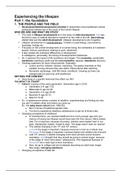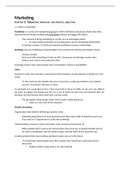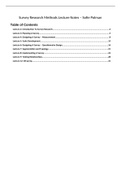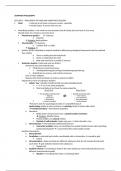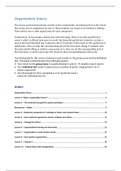Justice to Digital Crime
Contains: Extensive lecture notes of all lectures, including: slides content, remarks made by
lecturer, questions and answers, relevant comments made in the chat and explanatory
images.
MSc Cybersecurity Governance
2020 - 2021
1
,WEEK 1: Scoping the issue of digital
crime
“Why is this course called “digital crime”? How do we approach the issue of digital crime?
In the first lecture of this course, we will scope the issue of digital crime and discuss
relevant definitions, such as the definition of “cybercrime” and related problems. The
workgroup session will introduce you to the research skill taught in this course: a critical
evaluation of somebody else’s research.” - Syllabus.
Lecture 1: Scoping the issue of digital crime
”From Digital Justice to Digital Crime”: CSM governance track
- Challenge: transformation of criminal behaviour with the development of technology
- Governance and regulatory strategies to address this challenge
Meet your lecturer
You can approach cybersecurity from various perspectives. From foreign policy to the
nation state, cyber espionage etc. Why approach cybersecurity from digital crime and
justice? Think about this. Educating users, making networks secure etc. is important but:
when someone becomes a victim of cybercrime, the criminal justice responses are central.
Only way to avoid impunity. Also about cyberespionage. States increasingly resort to
criminal law responses. If we are talking about transformation of behaviour, we have to
answer the question on what is legal, what is criminal, what is not. We will approach
cybersecurity from the development of criminal behaviour etc.
Digital crime, policy and law
Book by Mark Goodman - famous in cybercrime. Now a futurologist. Books bought by the
lecturer. Many of the future crimes are everyday practice right now. Some of them vanished.
Another book: Medieval Europe by Chris Wickham.
Governance: a lot has changed, or has it?
- Harmonisation of legal frameworks, international cooperation, multi-stakeholder and
collaborative approaches
- Cyber enforcement gap?
New ways of commiting crimes, always think about law enforcement. Can law address the
problem, can it be there in time? You cannot make laws for future crimes. Criminal law is
the last resort remedy. Nowadays, many approaches to (international) cybercrime. Still often
behind.
2
,Lecturer wants us to get a deep knowledge about cybercrime. Legal and policy frameworks.
Also: discussion-based. Critical approach towards these frameworks, dangers, drawbacks,
opportunities. How big cases make good or bad laws. Aim of this course is to be a tool. By
being critical, you can preserve this mindset as to asking the right questions. Critical
thinking.
Digital crime: scoping the issue
What is crime?
- Act, activity, behaviour prohibited by law
- Punished with penalties and sanctions
- Defined mostly in the national law of sovereign states (except international crimes)
Remember:
- Nullum Crimen Sine lege: no crime without law
- Substantive law: what crime is
- Procedural law: how to investigate crime
→ What are we talking about? What is digital crime? Why not call it cybercrime?
● Contested term because it can be easily defined: behaviour prohibited by law. But,
the question is which law. Which law prohibits what act. National law, law of
sovereign state. Then the question is, what is crime? Pornography? Adultery? It
depends on the legislator of a specific state. This is where the definition of crime
gets complex.
● Remember when we think about crime: there is no crime without law. Nullum crimen
sine lege. → if it’s not in the law, it’s not a crime (in a particular country).
1. Substantive law = law that defines the substance of what crime is, list of crimes and
what is punishable
2. Procedural law = how do we investigate the crime? How to get the evidence? What
safeguards?
3. No law = not a crime
Q: Times of course?
A: Fully online. Always from 12.15 to 15.00. Same as Digital Justice timing. Tuesdays and
Thursdays EXCEPT for public holidays.
Transformation of criminal behaviour with the development of technology
- Computer crime
- Hi-tech crime
- Net-crime
- Internet crime
3
, - Cybercrime
● Criminal behaviour is being transformed via the development of technology. Various
words are used for this - computer crime, net-crime etc.
● Cybercrime is most used. But: the word is relatively meaningless by itself. Not
referenced in law, science or social construct. Used metaphorically to describe
hacking etc. Council of Europe in their Convention on Cybercrime adopted the term.
CoE did not define it. There is no definition of this in legal frameworks. Instead of
defining cybercrime or digital crime, we have to scope.
Q: You mentioned earlier the "cyber enforcement gap", would that contradict somehow the
no crime without law principle?
A: In many countries law was designed to protect objects in the physical world. Question
arose on how to protect digital objects/data. There are a lot of nuances: if data is accessed,
why does this not fall under property law. Legislators are able to catch up. Enforcement gap
is in the procedural law. How to investigate and prosecute. Information travels in seconds.
Law enforcement can only go as far as the state’s territory. Transnational nature of
cyberspace.
Defining cybercrime, or do we even need a definition?
“Cyber” and crime
Peter Grabovsky (2001): ”Old wine, new bottles”
“To be sure, some of the manifestations are new. But a great deal of crime committed with
or against computers differs only in terms of the medium.<...> It is less a question of
something completely different than a recognizable crime committed in a completely
different way”
David Wall (1999): “New wine, no bottles”
“What is significantly different this time is that the communications are two-way and can
reach a potentially infinite number of people across a wide range of jurisdictions almost
without restriction”.
Different perspectives on ‘cyber’ and crime
● Gabrovsky: nothing new about crime in cyberspace. Just the medium changed.
● Wall: new wine without bottles. The way cyberspace creates options to
communicate, etc. Indefinite number of victims across borders, not only a new
medium but also a new type of crime.
Sources: Grabosky, P. N. (2001). Virtual Criminality: Old Wine in New Bottles? Social &
Legal Studies, 10(2), 243–249; Wall, D. (1999). Cybercrimes: New Wine, No Bottles? Invisible
crimes, 105-139
Cyberspace and crime: new medium? New form?
4

